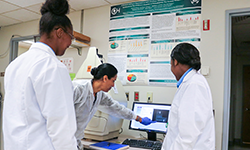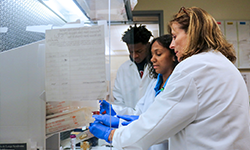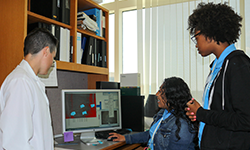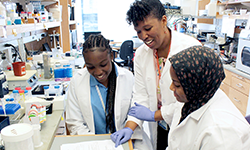HOW CAN WE HELP YOU? Call 1-800-TRY-CHOP
In This Section
Meet Eight High School Students Spending Their Summer With Science
School might be out for the summer, but science is still in for eight high school students participating in a unique six-week program called the Children’s Hospital of Philadelphia Research Internship for Scholars and Emerging Scientists (CHOP-RISES). Offered by the Office of Academic Training and Outreach Programs, CHOP-RISES gives students typically underrepresented in science the opportunity to work in some of our most innovative research laboratories and explore a variety of careers in science and medicine.
 From learning hands-on lab skills, to working with experienced mentors, to visiting various CHOP departments, it’s a busy summer but one that will no doubt “open doors, windows, and gateways to a lot of opportunities,” said Maninder Kaur, supervisor for the lab of Ian Krantz, MD. “A lot of the students will be taking biology in their junior and senior years, and now they will have hands-on experience and a head start — it’s not going to be just a figure they see in their textbooks.”
From learning hands-on lab skills, to working with experienced mentors, to visiting various CHOP departments, it’s a busy summer but one that will no doubt “open doors, windows, and gateways to a lot of opportunities,” said Maninder Kaur, supervisor for the lab of Ian Krantz, MD. “A lot of the students will be taking biology in their junior and senior years, and now they will have hands-on experience and a head start — it’s not going to be just a figure they see in their textbooks.”
 In the lab, the students learn a host of beneficial techniques such as how to pipette and work with complex lab equipment, explained Debbie McEldrew, supervisor for the lab of Nancy Spinner, PhD. And Almedia McCoy, supervisor for the lab of Eric Marsh, MD, PhD, adds that the program exposes students to key parts of lab culture such as learning how to present papers and data, and how to schedule and plan experiments.
In the lab, the students learn a host of beneficial techniques such as how to pipette and work with complex lab equipment, explained Debbie McEldrew, supervisor for the lab of Nancy Spinner, PhD. And Almedia McCoy, supervisor for the lab of Eric Marsh, MD, PhD, adds that the program exposes students to key parts of lab culture such as learning how to present papers and data, and how to schedule and plan experiments.
“Hopefully, they’re learning a little bit about perseverance, too,” McCoy said, “because that’s very important in science.”
 But arguably one of the program’s most unique features is that it provides students with an experience that they may not have had access to otherwise. This year, CHOP partnered with Paul Robeson High School for Human Services (Philadelphia, Pennsylvania), Dr. Charles E. Brimm Medical Arts High School (Camden, New Jersey) and the nonprofit organization, TeenSHARP (New Jersey, Pennsylvania, and Delaware) to identify students for participation in CHOP-RISES.
But arguably one of the program’s most unique features is that it provides students with an experience that they may not have had access to otherwise. This year, CHOP partnered with Paul Robeson High School for Human Services (Philadelphia, Pennsylvania), Dr. Charles E. Brimm Medical Arts High School (Camden, New Jersey) and the nonprofit organization, TeenSHARP (New Jersey, Pennsylvania, and Delaware) to identify students for participation in CHOP-RISES.
 “I think it’s a really good program for students who go to schools that don’t give opportunities like this,” said Saniah Aaron, a 16-year-old student at Paul Robeson High School for Human Services and a CHOP- RISES scholar. “My principal does his best to really get me out there because he knows this is what I want to do. I feel like if you have someone in your corner, even if you don’t come from the best background, and you have programs like this, you can really go far.”
“I think it’s a really good program for students who go to schools that don’t give opportunities like this,” said Saniah Aaron, a 16-year-old student at Paul Robeson High School for Human Services and a CHOP- RISES scholar. “My principal does his best to really get me out there because he knows this is what I want to do. I feel like if you have someone in your corner, even if you don’t come from the best background, and you have programs like this, you can really go far.”
Packed with journal clubs, field trips, and presentations, CHOP-RISES gets the students actively thinking about their future.
“I think one of the greatest parts of this program is that it exposes young students to all the different opportunities there are in science, which is something I didn’t know when I was a student,” said Sandra Luz, supervisor in the lab of Seema Bhatnagar, PhD. “I didn’t know there were so many job opportunities, not just your typical doctor path or researcher, but there’s so much in between.”
Meet our 2019 CHOP-RISES scholars, and learn what they love most about the program!
 Diana Byrd
Diana Byrd
Age: 16
School: Dr. Charles E. Brimm Medical Arts High School
Lab: Krantz Lab
Supervisor: Maninder Kaur
What’s one cool thing about the program so far?
“We visited the Center for Autism Research at CHOP, and they have a technology that helps kids with autism become more comfortable speaking with, or associating with, police officers. There’s a simulation that uses virtual reality that we had the chance to try out, and it’s so cool.”
 Saada Wing
Saada Wing
Age: 16
School: Mount Pleasant High School
Lab: Krantz Lab
Supervisor: Maninder Kaur
What’s one cool thing about the program so far?
“I feel like I’ve progressed in becoming more knowledgeable and learned how to do things on my own. [Maninder] teaches you that you have to do it on your own first, before getting help. And it’s really exciting to actually be in the lab and learn a lot of new and different things. My favorite thing so far would be PCR (polymerase chain reaction). I think it’s really interesting how you are able to make multiple copies of one sample of DNA.”
 Jordan Hawkins
Jordan Hawkins
Age: 16
School: Dr. Charles E. Brimm Medical Arts High School
Lab: Spinner Lab
Supervisor: Debbie McEldrew
What’s one cool thing about the program so far?
“I think it’s really cool how we can actually see how cells work and function. We can use a microscope and even take a picture of them!”
 Ade Forrest
Ade Forrest
Age: 16
School: Roman Catholic High School
Lab: Spinner Lab
Supervisor: Debbie McEldrew
What’s one cool thing about the program so far?
“Definitely extracting the DNA was what I found most interesting. You can take a sample, take DNA from it, and use PCR (polymerase chain reaction) to see the exact strain that you want.”
 Madizon Martinez
Madizon Martinez
Age: 16
School: Dr. Charles E. Brimm Medical Arts High School
Lab: Bhatnagar Lab
Supervisor: Sandra Luz
What’s one cool thing about the program so far?
“On the computer, I’ve learned how to use ImageJ to count all the cells in an image for image analysis, and so far, this is the most interesting thing that I’ve been taught! It’s completely new and something completely different. But every day, they’re exposing us to something different through the program. During lunch, they’ll have a career topic, and you can learn about more opportunities for the future. And we’re also going to get CPR-certified, so it’s opening up our ideas of what we want to take as our major and the different options for job opportunities.”
 Diamond McClelland
Diamond McClelland
Age: 16
School: Christiana High School
Lab: Bhatnagar Lab
Supervisor: Sandra Luz
What’s one cool thing about the program so far?
“I really like the career exposure because you explore different areas and campuses. For example, we went to the Roberts Center for Pediatric Research and the Center for Autism Research. I like that because it’s different. There are a lot of different careers that they offer that you don’t even know about or hear about.”
 Deborah Dibal
Deborah Dibal
Age: 16
School: MOT Charter High School
Lab: Marsh Lab
Supervisor: Almedia McCoy
What’s one cool thing about the program so far?
“What I love so far is the hands-on experience. In school, we do get to do stuff like pipetting, but this is a lot different because it goes beyond that: You get to do stains, you get to look at cells under a microscope. I really love the field trips because it’s not just working in the lab or learning about college; it’s also about looking at other parts of the medical field and what people do. We get exposure to a lot of different fields in medicine, and I feel like that’s really important.”
 Saniah Aaron
Saniah Aaron
Age: 16
School: Paul Robeson High School for Human Services
Lab: Marsh Lab
Supervisor: Almedia McCoy
What’s one cool thing about the program so far?
“The first thing would be the hands-on experience. When I’m learning, I need to do something hands-on to stay engaged. I think my favorite part would be the experiments. But in and out of the lab, I gain more knowledge about how to plan for the future, including finding a college that’s fit for me, finding ways to plan what I want to do, and how to go about it that best works for me. This program gives you a head start for college plans, but it also lets me gain knowledge on different areas of the medical field that I never thought about doing.”
 By
By